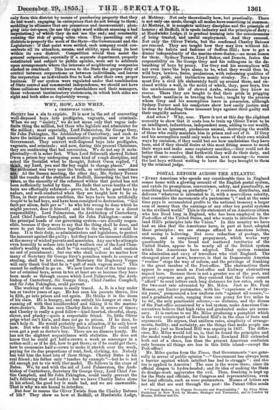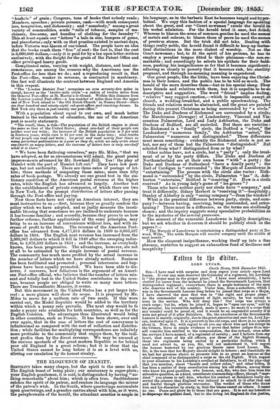POSTAL REFORM ACROSS THE ATLANTIC.
"EVERY American who spends any considerable time in England comes home with a glowing account of the English postal system, and extols its promptness, convenience, safety, and punctuality, as something bordering on perfection ": it receives, distributes, and delivers "whatever is intrusted to it, with a marvellous celerity, that resembles the movements of a pantomime "; "and at the same time pays in accumulated profits to the national treasury a larger sum of money than the earnings of any other ten postal systems in the civilized world." This is the statement of an American citizen who has lived long in England, who has been employed in the Post-office of the United States, and who wants to introduce Row- land Hill's principles into the Union.* In this country we have had an idea that the Americans have, in part at least, adopted these principles : we see stamps affixed to American letters, and seeing is believing. But some reduction of postage, the stamps, and a compulsory prepayment, which works very questionably in the broad and scattered territories of the United States, appear to be nearly all of the British system which the Americans have adopted. That system remains the admiration and envy of travellers who visit England. The strangest piece of news, however, is that in Democratic Amerioa " routine " stops the way of reform, and the privilege of franking is the great incubus ' of the Post-office. The obstructives there appear to argue much as Post-office and Railway obstructives argued here. Because there is not a greater use of the post, and. present expenses are great, they contend that the Union cannot "afford" to send letters such long distances for low rates, such as the two-cent rate advocated by Mr. Miles. Just as Mr. Paul Measor, our Exeter postmaster, with his "experience of twenty- six years," pronounced a low uniform rate "against all reason,"— and a graduated scale, ranging from one penny for five miles to is. 6d., the only practicable scheme,—so distance, and the disuse of the Post-office occasioned by a bad system, make American Con- servatives believe that high rates and graduated scales are neces- sary. It is curious to see Mr. Miles producing a pamphlet which is the very counterpart of Rowland Hill's in the class of facts and arguments. He argues, that uniform rates, simplicity of arrange- ments, facility, and certainty, are the things that make people use the post ; just as Rowland Hill was arguirg in 1837. The differ- ence, Mr. Miles would tell us, is, that he found the principles and the model ready developed to his hand ; Rowland Hill extracted both out of a chaos, less than the present American confusion only because all things are less in this little island—except the Post-office !
Mr. Miles quotes from the Times, that Governments "are gene- rally in arrear of public opinion "—" Government has always been a barrier against which intellect has had to struggle" : and this too is applied to America! The case is the worse there, since its official dragon is hydra-headed; and its idea of making the State do drudge-work aggravates the evil. Thus, franking is kept up for the State and officials, for Congress and representatives, even for local officials, such as some postmasters. Masses of letters are not all that are sent through the post: the Patent Office sends • "Postal Reform, its Urgent Necessity and Practicability." By Pliny Mika. Published in New York by Messrs. Stranger and Townsend, and in London by Messrs. TrUbner and Co.
"bushels" of grain ; Congress, tons of books that nobody reads ; Members, speeches ; private persons, cash—with much consequent loss, temptation, and dishonesty ; and " somebody," among a great variety of commodities, sends "rolls of tobacco, samples of ma- chinery, fire-arms, and bundles of clothing for the laundry " ! This at least equals our "letters" a bale in size, hampers of game, and pianofortes ; only with us that practice existed in ancient days, before Victoria was Queen of our island. The people have an idea that the books reaoh them "free" of cost: the fact is, that the cost is 3,000,000 dollars,—only it is paid for by a tax upon letter-writers exclusively, with the freight for the grain of the Patent Office and other privileged heavy goods. Complicated rates, varying with weight, distance, and local cir- cumstances, are among the reasons why the Americans use the Post-office far less than we do ; and a reproducing result is, that the Post-office, weaker in revenue, is contracted in machinery. One fact will illustrate the contrast between England and America in this reaped..
"The 'London District Post' comprises an area seventy-five miles in circuit, known as the twelve-mile circle '—a radius of twelve miles from the General Post-office at St. Martin's-le-Grand. Within this distance from the London central Post-office—a less number of miles than from the upper end of New York island to the Old Dutch Church' in Nassau Street—there are four hundred and ninety-eight sub-post-offices and receiving-houses. In New York city there is just exactly one post-office."
With a population about equal to our own, and much better trained in the rudiments of education, the use of the American post is nearly stationary.
"The result, then, is this—The population of the British empire is about the same as that of the United States; about one-half of their people can neither read nor write ; the increase of the British population is 5 per cent in fourteen years, while ours is 45 per cent in the same time ; nine-tenths of our people can read and write; we-print and read nearly four times as many periodical publications in et year as Meg do, while we only write about one-fourth as many letters, and the increase of letters here is only one-half what it is there."
"We have been flattering ourselves," says Mr. Miles, "that we have adopted, as far as circumstances will admit, the great postal improvements advanced by Mr. Rowland Hill. Yes ! the play of Hamlet with the part of Hamlet left out." They have low post- age, but not uniformity. There are three rates of postage of let- ters; three methods of computing those rates; more than fifty rates of book-postage. We already see one grand test in the sta- tionary condition of the American postal revenue at the higher rates, while the English has advanced so largely. Another test is the establishment of private companies, of which there are two in New York, for the prompt distribution of letters after passing through the Post-office and paying.
Now these facts have not only an American interest, they are most instructive to us ;—first, because they so greatly confirm the policy which we have adopted, and so justly measure the inesti- mable blessing that sometimes we are inclined to underrate because it has become familiar ; and secondly, because they prove to us how further reforms, further applications of the same principles, may bring to us an increase of convenience without loss, and with in- crease of profit to the State. The revenue of the American Post- office has advanced from 4,477,614 dollars in 1839 to 6,683,537 dollars in 1864. The English neat revenue has increased from the 2,503,947 dollars to which it fell in 1840 after the sweeping reduc- tion, to 5,976,532 dollars in 1854; and the increase, as everybody knows, has been progressive. The advantages, however, are not at all to be estimated by the simple increase of postal revenue. The community has much more profited by the actual increase in the number of letters which we have already noticed. Business has been facilitated and promoted ; personal intercourse and hap- piness have been equally promoted. We have been able to dis- cover, e converse, how fallacious is the argument of an Ameri- can Post-office official, who believes that the number of letters mis- sent and totally lost in the United States contributes to the reve- nue, because people are obliged to write so many more letters. There are Transatlantic Measors, it seems.
But this movement in the United States has a yet larger inte- rest: a mere glance will show its scope. It is proposed by Mr. Miles to move for a uniform rate of two cents. If this were carried out, the Model Republic would be added to the territory within which a penny rate prevails. The next step would be to make a penny rate available for both countries, as well as for the English Colonies. The advantages thus illustrated would bring in other countries, such as France. It has been shown, over and over again, that in the ease of letters the cost of conveyance is infinitesimal as compared with the cost of collection and distribu- tion; while facilities for multiplying correspondence are infinitely more profitable to the community that enjoys them, by the indi- rect profits than by the direct revenue. We may be amused at the Curious spectacle of the great modern Republic so far behind poor old England in a great reform; but it is clear that the -United States cannot be long before it is on a level with us, stirring our emulation by its honest rivalry.



























 Previous page
Previous page